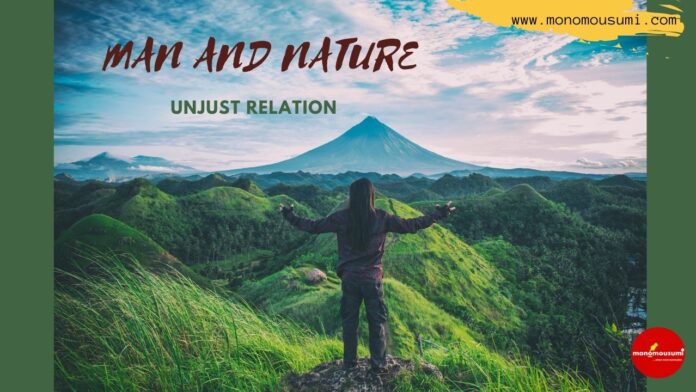What an apathy it is-
Environment nurtures human survival
But human attitude towards it is abysmal.
The limited and precious resources have been exploited a lot.
Now the environment is manifesting its anger nonstop.
Epidemics, disasters, global warming and heat waves
Climate extremities, drought and flood from them none can save
Few have exploited but everyone has to pay
Neither rich nor poor can escape the doomsday.
The flames of urbanization, industrialization, commercialization, commodification and rising consumerism have swallowed our pristine environment. Thoughtlessness, negligence, ignorance, avarice, lack of empathy, authoritative demeanor and lack of reasoned action have made man blind towards the caring and loving nature of Mother Earth. In the yearn to conquer territory, power and comfort man has failed to see the dimming luster and brimming darkness created due to overexploitation of natural resources. Modern man has forgotten that his existence would come under peril if he continues to destroy water, soil and earth’s green mantle. The ‘Throw away culture’ of man is making him victim of his own indifference. He fails to understand that an ecological undertow could defeat his best laid plans for progress.
HUMAN SURVIVAL IN PERIL
Destruction of environment for living a luxurious life has handcuffed existence of human. The degradation of ecology and destruction of ecosystems has affected economic, social, recreational, food and water security. It has dampened the opportunities that could have been created by the resources that Mother Nature has given us. It has shook the foundational ethos of charity, care and respect that are bedrock of human existence.
By clearing land for agriculture and development leading to unsustainable agricultural practices, expansion of crop and grazing lands into native vegetation, accelerating destruction of wild habits and forests, extensive mining and industrialization, humans have dug their own grave. These activities have led to biodiversity loss, land degradation and climate change. It has raised the ecological footprint and decreased the availability of resources.
Excessive uses of chemical fertilizers, pesticides and insecticides have destroyed soil structure and fertility. This degraded land supports bio magnification and bioaccumulation of these agents across trophic levels, lowering immunity levels of human beings and increasing toxicity across the food chain.
There is an interconnected vicious cycle caused by environmental degradation leading to degradation of soil, plant, animal, human and environmental health. Land exploitation due to deforestation and unsustainable practices has resulted in increased greenhouse gas emissions which has induced global warming and climate change. This has resulted in low agricultural productivity and poor crop yield creating fears of food and nutritional insecurity.
Further overexploitation of natural resources pushes humanity towards poverty. This can occur in two ways. First, greater food insecurity can lower labor productivity and hence decrease their capacity to work and earn. Second, as agriculture is largely dependent on monsoon, erratic rainfall due to extreme climatic events can lead to loss of livelihood in agriculture sector, potentially depressed incomes, forced migration and low per capita consumption. This is well highlighted by World Bank’s report ‘South Asia’s Hotspots: The Impact of Temperature and Precipitation changes on living standards’ which brings out economic impacts of climate change- a 2.8% fall in GDP and depress living standards of nearly half the country’s population by 2050.
The degradation of environment that has been done by humans to make their life smooth sailing is costing them heavily. The destruction is manifesting itself in form of global warming, heat waves, erratic monsoonal pattern, extreme climatic events which has led to poor health and increased morbidity in form of rising cancer and mutations. These new environmental health problems has led to increased spending by people on healthcare. As per the report ‘Global Environment Outlook’ by UNEP, India could save at least $3 trillion in healthcare costs if it implements policies ensuring that temperature didn’t heat up beyond 1.5 degree Celsius.
Zoonotic viruses are on a surge and knocking the door of human existence whether it’s Ebola, Zika, NIPAH or Covid -19. The rising pandemic outbreaks due to these viruses are a consequence of deforestation, intensified agriculture and livestock production, illegal and poorly regulated wildlife trade and climate change.
The emissions of carbon dioxide and other gases have increased beyond the capacity that the environment can absorb. Air pollution has increased to limits that it has locked us in our homes. It is affecting our health, education and economy. Industries, schools, everything has to be closed to save human life. Education has been disrupted, industries have been closed, and labor class is suffering. Are we really progressing?
Misuse of water and its overexploitation has created severe water scarcity. According to NITI Ayog report, nearly 600 million Indians face high to extreme water stress and 75% households do not having drinking water on their premises. This water shortage directly impacts women, threaten peace, leads to large scale displacement and inter-state water disputes. Thus, we have to pay for our misdeed.
MAN- NATURE RELATION: NEED OF NEW DIRECTION
Deserted lands, depleted green lungs, unhealthy environment and frequent pandemics…… is this what we want to gift the future generation?
Man needs to revisit his relationship with nature and rebuild an environmentally responsible world. He needs to imbibe and practice the concept of sustainable development. He needs to learn to co-exist with nature; otherwise nature will take revenge in a form that entire humanity will come in danger. We need to adopt a ‘Secure Sustainable and Innovative’ approach to protect and preserve environment. In words of Franklin D. Roosevelt “A nation that destroys its soils destroys itself. Forests are the lungs of our land, purifying the air and giving fresh strength to our people.”
The trio of internal consciousness, public awareness and pro-activeness can turn the nature over a new leaf where smoggy skies, filth, dirt, barren land, contaminated water are nowhere to be seen. Respect for nature and harmonious and sustainable lifestyle are at core of our traditions and part of our ethos. We worship trees, rain, seasons, soil and animals but still we don’t pay heed before destroying them.
Environment has no boundaries. It is a global common and for protecting it the entire global community should work towards 2050 vision for biodiversity “Living in harmony with Nature”. There has to be ‘One Health’ approach that caters to health of all three – plants, animals and humans. The need of the hour is community participation. Margaret Mead remarked “Never doubt that a small group of thoughtful, committed citizens can change the world; indeed, it is the only thing that ever has.”
A WAY TO ESCAPE THE DEAD END
A strong global political will can help to bind the world by a common objective of conserving environment. Increasing awareness about benefits of conserving biodiversity, regulating wildlife markets, promoting green jobs and working towards achieving carbon neutral economies can help to protect environment. Numerous conferences, institutions, policies and agencies have been created to safeguard environment and ensure continuity of human survival.
The soaring population globally has put a burden on natural resources. It needs land for shelter, for growing crops, for setting up industries to earn livelihood, for exploring resources and for his leisure activities. So controlling the population growth can ease burden on ecological resources.
Unsustainable agriculture is a major reason for the rapidly degrading land and other ecological resources like air, water. Afforestation, organic farming, crop diversification, dryland farming, drip and sprinkler irrigation practices, alley cropping, Silvopastoral systems, mixed crop livestock systems and agroforestry can help to restore degraded land. Relay cropping, reduced tillage, cover crops, integration of leguminous trees on farms, ridge tillage, planting pits and catchment ponds can help to preserve land. Stubble burning should be reduced by employing torrefaction technology, installing biomass plants and incentivizing farmers to sell residues for industrial purposes. Precision agriculture can only make agriculture ecological and sustainable.
Increase in greenhouse gas concentration leads to climate change and acidification which in turn leads to decline in the quality of air and soil. Thus initiatives to put a limit on the Greenhouse gas emissions and use of energy efficient appliances should be promoted.
Afforestation via Miyawaki method, green corridors, transplanting trees, using electric vehicles and biofuels can only end the increasing pollution. Scrubbers, catalytic precipitators and use of public transport can only sustain the oxygen the human survival needs. Van Dhan Yojana as adopted by state government of Rajasthan can be scaled up towards building a green mission to save our non- protected forests. Further as advocated by panchayats of Tarangar block, plants can be treated as ‘green members’ of our family, making tree as an inseparable part of ‘family consciousness’ as there is a crucial interconnection between humanity and nature.
Waste management is an important component to deal with for safeguarding environment. Tonnes of wastes produced globally is putting burden on landfills. So proper waste management strategies like reduce, reuse and recover waste; segregate waste, proper waste disposal and discovery of bioplastic bacteria like Zobellela denitrificans (ZDI) can reduce burden on landfills, and hence protect Mother Nature.
Biodiversity conservation has to be dealt with augmentation of monetary resources, time and capacities. The management and governance principles of ‘global commons’ have to be re-introduced into decision making and implementation of conservation, use and benefit sharing of ecological resources. Schumpeter’s approach of Creative destruction has to replace the traditional destruction to ensure survival of humans.
We the humans are required to sign global deal with nature whereby the communities living close to nature are actively engaged and the wisdom of indigenous people, fisheries and farmers has to be harnessed.
WINDING UP THOUGHTS
In 1972 by organizing Stockholm Conference, man has shown that he cares for the environment. Later numerous institutions at international and national level have been created in form of UNFCCC, UNEP, etc. to garner global support to sustain humanity. So let’s strive to build a relation that has balance and equitable reciprocity.
In the long run-
Environment is the driver, connector and supporter
That provides food to satisfy hunger
That quenches the thirst by giving water
That gives leisure and peace by harboring nature
That makes human survival possible by being a climate regulator
So let’s join hands and pull up our socks
To avoid, reduce and reverse environment degradation
By moving towards a path of conservation
To recover lost resilience in global ecosystem.
By DEEPIKA SINGLA
Write and Win: Participate in Creative writing Contest & International Essay Contest and win fabulous prizes.














